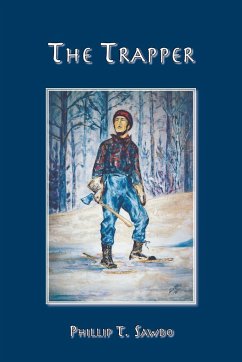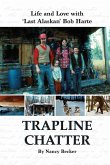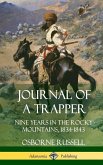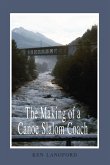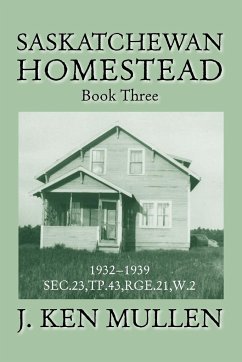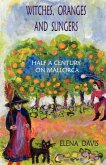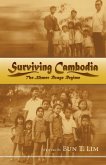Phillip T. Sawdo
The Trapper
Phillip T. Sawdo
The Trapper
- Broschiertes Buch
- Merkliste
- Auf die Merkliste
- Bewerten Bewerten
- Teilen
- Produkt teilen
- Produkterinnerung
- Produkterinnerung
The life of a First Nation family living in the bush in the early nineteen hundreds. The author writes about his early childhood when he would go trapping with his family. He also writes about when he had to go to war and when he returned. He writes about his trapping experiences, guiding tourists and poaching in Quetico Park.
Andere Kunden interessierten sich auch für
![Trapline Chatter Trapline Chatter]() Nancy BeckerTrapline Chatter23,99 €
Nancy BeckerTrapline Chatter23,99 €![Journal of a Trapper Journal of a Trapper]() Osborne RussellJournal of a Trapper30,99 €
Osborne RussellJournal of a Trapper30,99 €![The Making of a Canoe Slalom Coach The Making of a Canoe Slalom Coach]() Ken LangfordThe Making of a Canoe Slalom Coach18,99 €
Ken LangfordThe Making of a Canoe Slalom Coach18,99 €![Saskatchewan Homestead Saskatchewan Homestead]() J. Ken MullenSaskatchewan Homestead14,99 €
J. Ken MullenSaskatchewan Homestead14,99 €![Klaus Schulze Klaus Schulze]() Greg AllenKlaus Schulze24,99 €
Greg AllenKlaus Schulze24,99 €![Witches, Oranges and Slingers Witches, Oranges and Slingers]() Elena DavisWitches, Oranges and Slingers16,99 €
Elena DavisWitches, Oranges and Slingers16,99 €![Surviving Cambodia, the Khmer Rouge Regime Surviving Cambodia, the Khmer Rouge Regime]() Bun T. LimSurviving Cambodia, the Khmer Rouge Regime15,99 €
Bun T. LimSurviving Cambodia, the Khmer Rouge Regime15,99 €-
-
-
The life of a First Nation family living in the bush in the early nineteen hundreds. The author writes about his early childhood when he would go trapping with his family. He also writes about when he had to go to war and when he returned. He writes about his trapping experiences, guiding tourists and poaching in Quetico Park.
Hinweis: Dieser Artikel kann nur an eine deutsche Lieferadresse ausgeliefert werden.
Hinweis: Dieser Artikel kann nur an eine deutsche Lieferadresse ausgeliefert werden.
Produktdetails
- Produktdetails
- Verlag: Trafford Publishing
- Seitenzahl: 464
- Erscheinungstermin: 7. Juni 2004
- Englisch
- Abmessung: 229mm x 152mm x 25mm
- Gewicht: 667g
- ISBN-13: 9781412025188
- ISBN-10: 1412025184
- Artikelnr.: 58734745
- Herstellerkennzeichnung
- Books on Demand GmbH
- In de Tarpen 42
- 22848 Norderstedt
- info@bod.de
- 040 53433511
- Verlag: Trafford Publishing
- Seitenzahl: 464
- Erscheinungstermin: 7. Juni 2004
- Englisch
- Abmessung: 229mm x 152mm x 25mm
- Gewicht: 667g
- ISBN-13: 9781412025188
- ISBN-10: 1412025184
- Artikelnr.: 58734745
- Herstellerkennzeichnung
- Books on Demand GmbH
- In de Tarpen 42
- 22848 Norderstedt
- info@bod.de
- 040 53433511
May I take this opportunity to thank the Sawdo family for the honour of presenting the eulogy for my friend Phil. It is my hope that this eulogy will reflect the feelings of many. On Monday, just one day after Phil's death, Jean and Linda came to my office to talk about the topics for this eulogy. I quickly noted how composed the two ladies were. I then indicated that I was impressed by this composure - Jean remarked, it is because Phil prepared me and my family for his death. I think the final act of preparing his family for his death was indicatory of how Phil handled life. Something as shocking as his own death, the sudden termination of his life, represented a chore for him - unselfishly preparing his family for his death at a time when all his thoughts could have been justifiably on himself. He was a person who made a career out of understanding life in perspective with the realities of life and as a result could help others understand themselves and their situations. I asked Jean, "What topics would you like m to talk about in Phil's eulogy?" Jean replied, "I would like you to talk about the feelings others had towards Phil." A chore which I felt would be a pleasure at a sad time for me. I contacted some close friends of Phil's. It Is interesting to note that I contacted each of these people at separate times yet all had the same things to say about Phil. I would also like to mention that I asked these people about negative aspects Phil may have possessed. All indicated that at times Phil presented a philosophy of life that may have been perplexing, but it in turn made one think and understand. This in turn made these people all the better for it. The most important love of Phil's life was his wife Jean. They were lovers, best friends - a team. They planned their unique life, shared thoughts, selected goals which were personal and very much different from the conventional ways that most of us pursue. Although Phil was very independent and resourceful, he relied very heavily on the emotional support of Jean. Phil was a visionary who not only taught his family the realities of life, how to cope with these realities, but how to take care of themselves and their feelings in a very positive manner. The result of Phil and Jean's philosophy of life are clearly identified in their highly successful children. Phil was a trapper. He loved this craft. He selected this way of supporting his family over the more structured and financially lucrative jobs that life had to offer. He lived on the land and lived off the land. Rather than seeing himself as a person who exploited the furs of animals, he saw the role of the trapper as maintaining nature's balance. He was a proud trapper who detested bureaucrats, or interest groups who publicly condemn the trappers' craft without understanding the realities of life or the realities of the animal world. Although he did not have a formal education, Phil became a top conversationalist by his insatiable need to understand life and how life pertained to nature. He used methodical and practical thinking in everything he did. I cannot even remember Phil doing something that was not well thought out. Although Phil's primary interest in life was trapping, he excelled as a wilderness guide, prospector and constructing cabins. He was a member of the Royal Canadian Legion Branch 145 on Atikokan having been a veteran of Word War Two. He served overseas as a paratrooper from 1941 until his discharge in 1946. Phil was a member of the Ontario Trappers Association and the Lac Des Mille Lacs Indian Reserve. He was a teacher to all. Many times and for many days at a time Phil would work alone in the physical sense which gave him all the company he needed. One cannot help but feel that Phil developed and intimate and personal relationship with nature. It was like he accepted nature's challenge to be understood. Not only could Phil sense and understand his life in nature, but he could...

